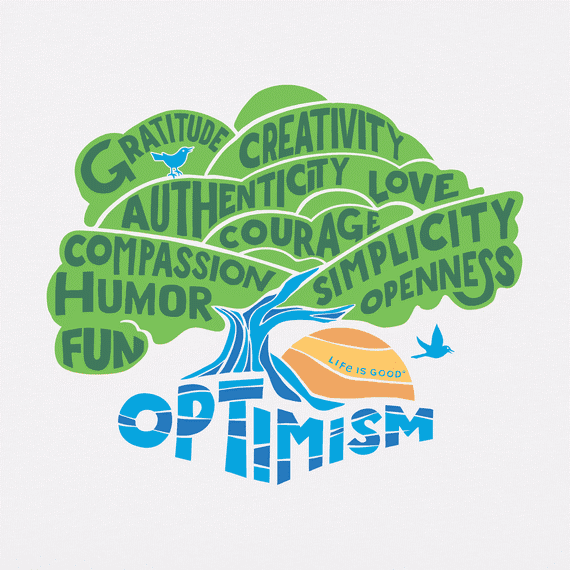The authors of the Life Is Good book (and founders of the Life Is Good company), Bert and John Jacobs, grew up in my hometown of Needham. They lived across the street from the Cricket Playground where we spent summers playing kickball, singing silly songs, and playing games in the field house on rainy days. While I didn’t know the whole family, I knew Bert, who was close to my age – and I knew they had a big family and came from rather humble beginnings.
We all know what a great company Life Is Good (LIG) became, and many of us (myself included) own Life Is Good hats, t-shirts or other products sporting the image of “Jake” with his infectious orange-slice smile. What a treat it was for me to read this book and learn the details behind the story of 2 college grads who sold t-shirts out of their van (named “The Enterprise”) and grew LIG into a $100 million company!
Viewing this story through my professional lens, I am impressed by the mission of Life Is Good — “to spread the power of optimism.” What a refreshing change from all the negativity in the world right now. I was also struck how these brothers remained true to their values through the ups and downs of growing a business and created a corporate culture that many organizations would love to have.
Reading this blog is no substitute for reading the book, but let me whet your appetite with an overview of their sage advice, linked to their “10 superpowers”:
- Openness. Be open to new ideas and experiences; changing up your routine and your physical surroundings will open your mind to fresh perspectives. Adopt the rule of “yes, and…” used by improv comedians. In short: when you are brainstorming and collaborating, accept and build on each other’s ideas rather than “brainstomping” with the word “no.”
- Courage. Challenges and adversity, self-doubt, skeptics – those barriers will always be there. Don’t be afraid to fail forward, then adjust and move on. Have the courage to try new things. Heed hockey great Wayne Gretzky’s advice: “You miss one hundred percent of the shots you don’t take.”
- Simplicity. Say “yes” to the things that really matter and “no” to the rest. Unplug. Hit the “reset button” with yoga, meditation, fresh air, laughter and time with friends. When these two brothers found they were becoming slaves to email, they made the bold move of dropping their email accounts and letting their team at Life Is Good prioritize and summarize the most important communication for them. The result? Increased productivity and the freedom to focus on what is really important.
- Humor. Humor is the great equalizer, according to Bert and John, and they have all the right instincts when it comes to creating a fun, productive work environment at LIG. “When management is willing to let their guard down and laugh openly, especially at themselves, it invites others to do the same,” they said. Humor leads to more unity and productivity in the workplace…and it is healthy to laugh! Bert and John tell a great story of landing the Galyan’s account (later acquired by Dick’s Sporting Goods) before they had money to “wine and dine” – so they invited the Galyan executives to their small Boston apartment for a Ragu and pasta dinner. In the end, it was the laughter around that dinner table that led to the long-term business relationship – and helped take the LIG brand national.
- Gratitude. See the glass as half-full, not half-empty. Being grateful is a mindset: change your mindset from “I have to” to “I get to.” It’s no surprise that Thanksgiving is a favorite holiday of the Jacobs brothers, because it showcases the superpowers of simplicity, love, humor and gratitude – but their advice is, “don’t limit gratitude to just one day. Take time every day to express your gratitude to others.”
- Fun. Bert and John point to Dr. Seuss as a great example of someone who brought the power of fun to the task of reading – and changed the lives of teachers, parents and students as a result. “Fun is not a dessert reserved for special occasions; it’s a healthy party of the main course.” The company commitment to fun resulted in the birth of their Life Is Good Festivals; their “Backyard Athlete” competition at Fenway Park (featuring games ranging from seed-spitting to Wiffle ball home run derby); and their partnership with Camp Sunshine, an organization that offers vacation retreats and other forms of support for sick children and their families. In 2006 on the Boston Common, LIG teamed up with Camp Sunshine to gather 30,128 pumpkins in one place – breaking a world record and raising over $500,000 for Camp Sunshine.
- Compassion. Kids are the ultimate optimists and the inspiration for the LIG brand, so they are a natural fit for LIG’s charitable giving – thus, the decision was made to donate 10% of the company’s annual profits to helping kids in need. When friend Steve Gross started the nonprofit Project Joy, focusing on the social and emotional health of Boston’s most vulnerable children, Bert and John were “in.” Eventually Project Joy pivoted to “helping the helpers” by providing training and care for frontline caregivers. The partnership grew tighter and eventually, the Life Is Good Kids Foundation absorbed Project Joy, renaming it The Playmakers and placing their offices in the center of LIG’s headquarters in Boston. Two takeaways relative to compassion: 1) compassion begins with kindness to yourself. 2) Adopt a “just like me” mindset to help break down barriers and find common ground and resolution.
- Creativity. According to Albert Einstein, “creativity is intelligence having fun.” Decorate your home or work space with colors that lift your mood and inventiveness (a favorite quote from the book: “Who wouldn’t cancel a full day with beige to go to a meeting with green or a party with yellow?”. Physically explore your world to find inspiration – “exploreate”. Choose any subject you love – read about it, listen to information about it and do something related to that subject. Lastly, don’t keep creativity to yourself – invite others to join you. Connect, collaborate and create.
- Authenticity. “Be yourself; everyone else is taken” (Oscar Wilde). Bert and John’s definition of branding? “Know who you are and act like it.” Understand that customers build your brand. “It’s not rocket science; we listen and try to deliver what people want.” When you screw up, admit it – people appreciate honesty. Don’t be afraid to take a stand, or to make a decision based on what feels authentic to you. Tell your “heritage story” by sharing what’s different and special about your company and your products; people appreciate companies, and individuals, that are real.
- Love. Bert and John compel us to “spread love like peanut butter.” The more you share your love, the more you connect with the people you love and the richer your life will be. Think about the strength of love during the Boston Marathon bombings. As a direct reaction to that horrific act of hate in 2013, millions of people performed acts of love; and this inspired LIG to create their “BOSTON: Nothing Is Stronger Than Love” t-shirt. The Boston LOVE shirt became their best seller, generating over a half of a million dollars in profit (and in their own act of love, the company donated every penny to The One Fund, established to help the victims and their families).
Here’s a question: what superpowers do you have and which ones do you want to work on? For further inspiration, learn more about this innovative company and its founders at www.lifeisgood.com. And for heaven’s sake, read the book!
Robin Schell, APR, Fellow PRSA is Senior Counsel and Partner at Jackson Jackson & Wagner, a behavioral PR and management consulting firm based in the Seacoast. For more information about JJ&W, visit www.jjwpr.com or contact Robin at rschell@jjwpr.com.

